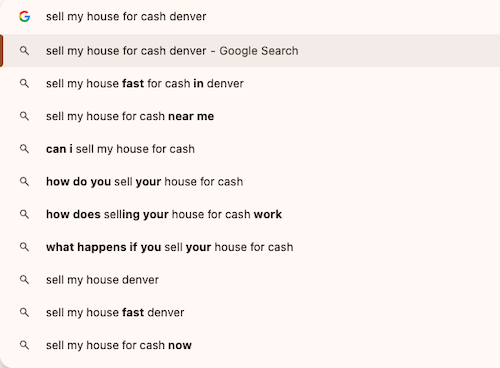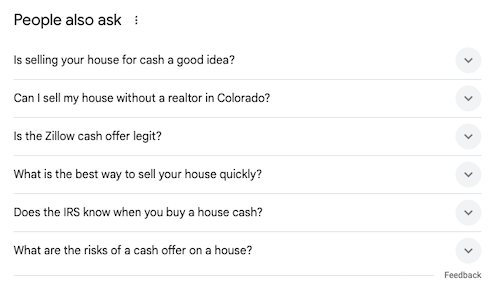No matter what type of real estate investing you specialize in, finding the right deals makes or breaks the bottom line. And if you don’t want to spend all day, every day hustling and cold calling, having motivated leads come to you online is a great way to keep your pipeline filled.
But how do you stand out in a crowded market and make sure leads find YOU first? Here are some actionable takeaways you can use to make yourself the most successful investor in your area.
KEY TAKEAWAYS
- Putting unique content on your website is key to ranking well in search engines and building trust with potential leads. If you use pre-written blog templates or an AI writing tool, take the time to add your own personality and insights before publishing.
- Getting hyperlocal is a great way to stand out. People prefer working with someone they can trust, and they’re more likely to trust someone from their community versus a nameless, faceless investor.
- Look at your competitors’ websites or top-ranking sites in other areas to figure out what you absolutely must have on your site and get inspiration for how to attract leads.
In a competitive real estate market, you have to find ways to stand out. By doing your research, providing high-quality information on your website, and building trust by being hyper-local, you can stand out from the competition, attract leads, and fill your deals pipeline.
Table of Contents
- Understand What You’re Up Against … and How to Stand Out
- Share Unique, High-Value Content
- Localize Down to the Neighborhood
- Showcase Your Local Knowledge
- Build a (Recognizable) Brand
- Be Yourself, Just Online
1. Understand What You’re Up Against … and How to Stand Out
The first step of standing out is knowing your competition. Start by using Market Scout to see how difficult your investment market is, get marketing strategy recommendations, and see marketing insights like average website domain authority in your area, keyword difficulty, and how much paid ads cost.
Glossary:
- What is website domain authority? Domain authority is a score that measures your website’s quality and reputation based on key metrics like organic traffic, authenticity, and quality backlinks. While domain authority doesn’t directly contribute to search rankings, it is a good indicator of how search engines view your site. A higher domain authority score is better.
- What is keyword difficulty? Keyword difficulty is a metric used to understand how many sites are targeting a specific keyword and, in return, how difficult it is to rank for that keyword. The higher the score, the more competition there is for that keyword.
Now that you have a general understanding of the market and know what type of marketing strategies you should double down on (like SEO, content creation, or video), it’s time to dig deeper. Google keywords you want to rank for to see what information and linked websites come back in Google’s AI Overview and which webpages rank at the top of the search results. Take a look at these pages to see what they’re doing — what pages do they have, what kind of information do they share, what keywords are they obviously targeting? Use this as inspiration for what to include on your own website, then do it better!
(Note: Don’t ever copy someone’s website, copy, blogs, or videos exactly. Use theirs for inspiration, but create your own content with your own spin and personality.)
Do you find yourself saying, “But what about this?” when reading a competitor’s website? That’s a great signal that you should fill that gap!
2. Share Unique, High-Value Content
SEO trends are changing, but one thing remains the same: Search engines love unique content that is insightful, helpful, and answers common questions using the same language a searcher would use.
In today’s online world, you can’t simply set up a website with basic pages and expect to rank or generate leads. You have to add additional topical pages, blogs, and FAQs to share your knowledge and gain a competitive edge.
What questions have your clients asked in the past? What concepts do you find yourself explaining over and over? Are there any unique regulations or laws in your area that impact clients? These are all great topics for creating unique content on your site.
You can also use Google’s autofill feature (start typing a search term and look at the phrases Google suggests) and the “People Also Ask” section of the search results to get ideas. These are based on real things people are searching for, so providing that information can help you attract leads.


Looking for unique topics to cover doesn’t mean you shouldn’t explain important terms or concepts your leads need to know just because everyone else does. Just focus on explaining it like you would in person, especially if your area has a specific dialect or uses certain terms. If you can, add details and data specific to your region (this is exactly the type of unique, high-value content search engines love).
3. Localize Down to the Neighborhood
Online search is becoming more and more localized. Even if someone doesn’t specifically search for something near them, search engines often serve up local results anyway. (Do a random Google search and scroll to the bottom of the first page. You might see a shockingly accurate location tag. My location changes when I’m five minutes away from my house because I’m in a different neighborhood within my city!)
To make sure you come out on top either way, launch localized webpages targeting specific cities, towns, and even neighborhoods.
What is a localized webpage?
A localized webpage is a page on your website that uses a specific location as a target keyword. For example, if you’re a wholesaler in Colorado, you might have a webpage targeting Denver. The URL could be something like www.yourcompany.com/sell-house-fast-denver and the text at the top of the page (the H1) would say “Sell Your House Fast in Denver, Colorado.” This gives you a better chance of showing up in search results when someone specifically searches Denver or is in the Denver area.
Set up webpages for more than one location
But if you’re a real estate wholesaler in Colorado, you likely don’t only do deals in Denver. So you’ll want a localized page for every area you want to attract leads in — Lakewood, Westminster, Aurora, Arvada, etc. And remember how Google gets hyper-specific with your location? If you’re in an area with commonly used neighborhood names, set up localized pages for those as well. To keep with our Denver example, you might set up pages for West Highlands, East Colfax, or RiNo. This gives you a better chance of attracting attention from potential leads when they see that you really understand where they are.
4. Showcase Your Local Knowledge
Speaking of connecting with leads on a local level …
Despite living in an always connected, global world, many people still like working with someone local. Think about the last time you needed a home contractor or mechanic. You might have Googled it, but you’re equally likely to have asked your friends, family, and trusted local network for a recommendation. People want to work with someone they can trust, and being local goes a long way in building rapport.
Having a webpage targeting a specific town or neighborhood grabs attention, but what really builds trust is showing how much you know and understand the area. A few blocks can make a dramatic difference in many cities, and towns only a few miles apart might be night and day different when it comes to real estate. A big, national company won’t understand that.
Look at each of those localized webpages you created and figure out what information you can add to highlight your knowledge of the area and give leads useful insights. A few examples include:
- Highlighting deals you’ve done in the area
- Sharing reviews or testimonials from past clients in that area
- Explaining local regulations that may impact your leads
- Calling out trends or local news that might be impacting the market in that area
You can even stand in front of a recognizable neighborhood landmark and film a short video introducing yourself and your services using the specific area name.
5. Build a (Recognizable) Brand
Things like local videos published online help build your brand, which can go a long way in attracting leads and having leads choose you — especially in a crowded market.
One of the five lessons shared in 5 Priceless Lessons from Million Dollar Investors is about getting personal and building a brand. It’s partially about putting people at ease as they decide who to work with, and partially about making sure you’re the one they think about right away when the time comes.
“I want to make sure I have the brand so that if someone is thinking about selling their house in my market, they’re thinking about my company.” — Jeremy Resmer
Traditional tactics like direct mail and bandit signs might help with this, but so do things like posting videos online or sponsoring a local little league team. Bigger ticket items like local TV or radio ads help with brand building, but if you’re creative and keep it local, you can find good opportunities to get your name, face, and logo out there.
“Hey! I know you!” Real-Life Brand Building
Justin Turner owns Turner Home Team in eastern North Carolina. Looking for a way to stand out and generate leads, he turned to a somewhat old-school method of advertising — billboards.
“I’ve had so many people tell me they’ve seen my billboard. It leaves a lasting impression and brings more awareness than other campaigns,” Justin explained. “It makes me visible in my community in a way online ads can’t, helping me build real, local brand recognition that creates a stronger sense of trust.”
It wouldn’t work without his website though. He warns this method (and any other offline outreach, like direct mail) relies on having a professional online presence.
“[You have to have] a website people can research you on — they’re not going to do deals with some sketchy person just because of a billboard.”
Since investing in billboards, Justin’s monthly organic brand searches on Google have more than doubled. After drawing in interested leads with the billboard, he uses his website to build trust and gain confidence by showcasing his experience, professionalism, honesty, and — most importantly — his team.
“People trust those who they can relate to and understand.”
Be Yourself, Just Online
If there’s a theme to all of this advice, it’s to be authentic and helpful. Attracting leads is the name of the game, but the best way to do that is by remembering that leads are people.
“This is a people business and real estate is a byproduct of what we do.”
— Beau Hollis, 5 Priceless Lessons from Million Dollar Investors
Do you find it easier to generate business face-to-face or by building in-person relationships? Bring that spirit and energy to your website. Using a few technical details shared in this post (like launching hyperlocal webpages) can get you in front of new eyes, but it’s up to the rest of your website content to sell your story. Be unique, be helpful, be approachable … be yourself.